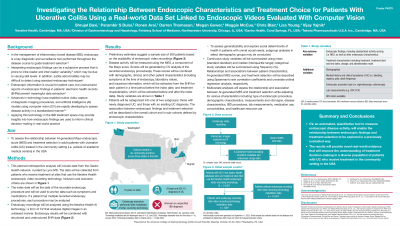Tuesday Poster Session
Category: IBD
P4279 - Investigating the Relationship Between Endoscopic Characteristics and Treatment Choice for Patients With Ulcerative Colitis Using a Real-World Data Set Linked to Endoscopic Videos Evaluated With Computer Vision
Tuesday, October 29, 2024
10:30 AM - 4:00 PM ET
Location: Exhibit Hall E

Has Audio

Megan Gower
Takeda Pharmaceuticals U.S.A., Inc.
Cambridge, MA
Presenting Author(s)
Shrujal Baxi, MD1, Parambir S. Dulai, MD2, Ronen Arai, MD3, Darren Thomason, 1, Megan Gower, 4, Maggie McCue, 5, Chris Blair, 4, Lisa Young, 4, Vijay Yajnik, 4
1Iterative Health, Cambridge, MA; 2Feinberg School of Medicine, Northwestern University, Chicago, IL; 3Gastro Health, Coral Springs, FL; 4Takeda Pharmaceuticals U.S.A., Inc., Cambridge, MA; 5Takeda Pharmaceuticals, USA, Inc., Cambridge, MA
Introduction: In inflammatory bowel disease (IBD), endoscopic assessment of disease activity guides treatment selection. Reading of endoscopic images can be subjective in nature, influenced by inter-reader variability, and may not capture subtle changes in appearance that could influence treatment decisions. Technological advances have enabled routine video capture of endoscopic procedures and the application of artificial intelligence (AI) tools to rapidly assess disease activity in a quantitative, unbiased manner. Linking endoscopic assessments to treatment selection may provide insight into how patients are chosen for targeted IBD therapies in routine practice, and how factors other than disease activity may influence treatment selection.
Methods: Using novel methods, this planned retrospective database analysis will combine data from endoscopic images, analyzed using AI, with electronic health record (EHR) data to investigate the relationship between endoscopic findings and treatment decisions in patients with ulcerative colitis (UC) in the U.S.
Results: This study will use data from a large GI community site network that includes > 100 sites across 7 US states. Eligible patients will be adults diagnosed with UC. Endoscopic images will be analyzed using computer vision, a form of AI that extracts information from digital images, and linked to EHR using structured and unstructured data elements. Demographic and clinical characteristics will be collected for each patient, including symptoms at the time of endoscopy, endoscopic disease activity, treatments received, laboratory values, and insurance information. A combined model will be developed using patient metadata and endoscopic image data to understand determinants of treatment selection. Relevant data elements will be described in the overall cohort and stratified sub-cohorts defined by endoscopic characteristics. As diversity and inclusion are important for the development of new health technologies and their use in real-world settings, we plan where feasible to explore social determinants of health variables to better understand patients with unmet social needs. Preliminary estimates suggest a sample size of 308 patients.
Discussion: The study will leverage computer vision to generate insights into treatment decision-making in patients with UC using endoscopic data from a cohort managed at community sites. The results will provide novel real-world evidence that will improve understanding of clinical care in a diverse community setting.
Disclosures:
Shrujal Baxi, MD1, Parambir S. Dulai, MD2, Ronen Arai, MD3, Darren Thomason, 1, Megan Gower, 4, Maggie McCue, 5, Chris Blair, 4, Lisa Young, 4, Vijay Yajnik, 4. P4279 - Investigating the Relationship Between Endoscopic Characteristics and Treatment Choice for Patients With Ulcerative Colitis Using a Real-World Data Set Linked to Endoscopic Videos Evaluated With Computer Vision, ACG 2024 Annual Scientific Meeting Abstracts. Philadelphia, PA: American College of Gastroenterology.
1Iterative Health, Cambridge, MA; 2Feinberg School of Medicine, Northwestern University, Chicago, IL; 3Gastro Health, Coral Springs, FL; 4Takeda Pharmaceuticals U.S.A., Inc., Cambridge, MA; 5Takeda Pharmaceuticals, USA, Inc., Cambridge, MA
Introduction: In inflammatory bowel disease (IBD), endoscopic assessment of disease activity guides treatment selection. Reading of endoscopic images can be subjective in nature, influenced by inter-reader variability, and may not capture subtle changes in appearance that could influence treatment decisions. Technological advances have enabled routine video capture of endoscopic procedures and the application of artificial intelligence (AI) tools to rapidly assess disease activity in a quantitative, unbiased manner. Linking endoscopic assessments to treatment selection may provide insight into how patients are chosen for targeted IBD therapies in routine practice, and how factors other than disease activity may influence treatment selection.
Methods: Using novel methods, this planned retrospective database analysis will combine data from endoscopic images, analyzed using AI, with electronic health record (EHR) data to investigate the relationship between endoscopic findings and treatment decisions in patients with ulcerative colitis (UC) in the U.S.
Results: This study will use data from a large GI community site network that includes > 100 sites across 7 US states. Eligible patients will be adults diagnosed with UC. Endoscopic images will be analyzed using computer vision, a form of AI that extracts information from digital images, and linked to EHR using structured and unstructured data elements. Demographic and clinical characteristics will be collected for each patient, including symptoms at the time of endoscopy, endoscopic disease activity, treatments received, laboratory values, and insurance information. A combined model will be developed using patient metadata and endoscopic image data to understand determinants of treatment selection. Relevant data elements will be described in the overall cohort and stratified sub-cohorts defined by endoscopic characteristics. As diversity and inclusion are important for the development of new health technologies and their use in real-world settings, we plan where feasible to explore social determinants of health variables to better understand patients with unmet social needs. Preliminary estimates suggest a sample size of 308 patients.
Discussion: The study will leverage computer vision to generate insights into treatment decision-making in patients with UC using endoscopic data from a cohort managed at community sites. The results will provide novel real-world evidence that will improve understanding of clinical care in a diverse community setting.
Disclosures:
Shrujal Baxi: Iterative Health, Inc. – Employee, Stock Options.
Parambir Dulai: AbbVie – Consultant. Abivax – Consultant. Adiso – Consultant. Bristol Meyer Squibb – Consultant. Digbi Health – Royalties. Digbi Health – Stock Options. Geneoscopy – Consultant. GSK – Consultant. Janssen – Consultant. Lilly – Consultant. Pfizer – Consultant, Grant/Research Support. Precidiag – Licensing royalties. Takeda – Consultant, Grant/Research Support.
Ronen Arai: Abbvie – Speakers Bureau. BMS – Speakers Bureau. Castle Biosciences – Speakers Bureau. Celltrion – Speakers Bureau. Janssen – Speakers Bureau. Lilly – Speakers Bureau. Pfizer – Speakers Bureau. Phathom Pharmaceuticals – Speakers Bureau. Prometheus Pharmaceuticals – Consultant. Takeda – Speakers Bureau.
Darren Thomason indicated no relevant financial relationships.
Megan Gower: Takeda Pharmaceuticals U.S.A., Inc. – Employee, Stock Options.
Maggie McCue: Takeda Pharmaceuticals U.S.A., Inc. – Employee, Stock Options.
Chris Blair: Takeda Pharmaceuticals U.S.A., Inc. – Employee, Stock Options.
Lisa Young: Takeda Pharmaceuticals U.S.A., Inc. – Employee, Stock Options.
Vijay Yajnik: Takeda Pharmaceuticals U.S.A., Inc. – Employee, Stock Options.
Shrujal Baxi, MD1, Parambir S. Dulai, MD2, Ronen Arai, MD3, Darren Thomason, 1, Megan Gower, 4, Maggie McCue, 5, Chris Blair, 4, Lisa Young, 4, Vijay Yajnik, 4. P4279 - Investigating the Relationship Between Endoscopic Characteristics and Treatment Choice for Patients With Ulcerative Colitis Using a Real-World Data Set Linked to Endoscopic Videos Evaluated With Computer Vision, ACG 2024 Annual Scientific Meeting Abstracts. Philadelphia, PA: American College of Gastroenterology.
